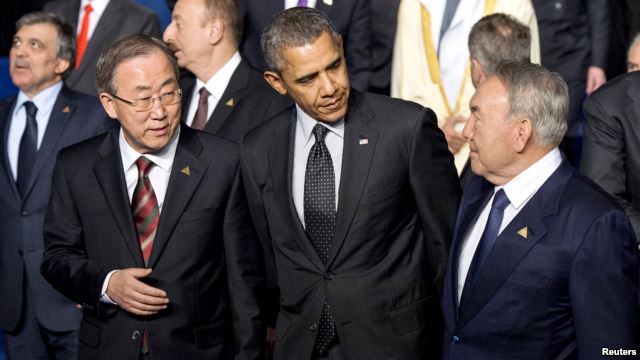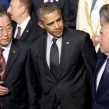
Kazakhstan Promotes Nuclear Security Agenda at Hague Summit
Publication: Eurasia Daily Monitor Volume: 11 Issue: 64
By:

While generally trying to avoid confrontations with other countries, there are some issues on which Kazakhstani President Nursultan Nazarbayev refuses to compromise—one is regional integration, another is nuclear non-proliferation. At last week’s Nuclear Security Summit (NSS) in The Hague, Nazarbayev supported measures to counter nuclear terrorism but also launched a sharp critique of the existing nuclear order. He decried that the United States, Russia, and the other nuclear weapons states had not made greater progress in nuclear disarmament and for not fulfilling their guarantees to countries like Ukraine and Kazakhstan, which eliminated their own arsenals (https://www.nss2014.com/sites/default/files/documents/national_statement_kazachstan.pdf).
Kazakhstan’s diplomacy has traditionally used these biannual summits to launch various nuclear non-proliferation initiatives and to highlight the country’s own contributions. These started with independence, when Kazakhstan rapidly eliminated the nuclear arsenal it inherited from the Soviet Union and closed the world’s largest nuclear weapons test site at Semipalatinsk. In 2010, Astana hosted the Conference of the Global Initiative to Combat Nuclear Terrorism and completed a major effort to transport 210 tons of spent nuclear fuel to safer storage. In 2012, Kazakhstan worked with Russia and the United States to secure more than a dozen bombs’ worth of weapons-grade plutonium from its storage site at Degelen Mountain. More recently, Kazakhstan joined the Global Partnership against the Spread of weapons of mass destruction (WMD) and ratified the 2005 Amendment to the Convention on the Physical Protection of Nuclear Material. Kazakhstan is now implementing a pilot project with the International Atomic Energy Agency (IAEA) to ensure the physical security of uranium during extraction and is finalizing efforts to host the world’s first uranium fuel bank in partnership with the IAEA (https://www.nss2014.com/sites/default/files/documents/kazakhstan.pdf).
Kazakhstan has endorsed all NSS goals, including promoting the safe use of nuclear energy, augmenting the IAEA’s role and authority in nuclear safety and security, adopting stronger measures to secure radiological sources that terrorists can employ in “dirty bombs,” as well as encouraging commercial nuclear power producers to stop using highly enriched uranium (https://kaz2050.kz/en/news/7280/). Kazakhstan also favors creating new international instruments and stronger measures by the United Nations to encourage countries to comply with nuclear security rules and conventions (Kazakh TV, March 25).
In his speech at the March 24–25 summit, as well as in an article written shortly before then, Nazarbayev recalled these contributions and proposals. He also used the occasion to comprehensively critique the nuclear non-proliferation regime. In particular, Nazarbayev expressed dissatisfaction with the protection the great powers provide countries that, like Kazakhstan and Ukraine, abandon nuclear weapons. He proposed creating an international office under the UN to monitor how the nuclear weapons states fulfill their security guarantees to countries that renounce nuclear arsenals and join nuclear-weapons-free zones (https://www.nss2014.com/sites/default/files/documents/national_statement_kazachstan.pdf). Nazarbayev also called the Non-Proliferation Treaty (NPT) “unfair” and unbalanced. He wants to revise the treaty so that the original five nuclear weapons states must also give the IAEA complete information regarding their civilian nuclear projects, programs and plans (https://www.kazakhstan.at/index.php?id=news_detail&tx_ttnews[tt_news]=737&cHash=0c6dd5a0257af07bd4029cb5263d5649).
Kazakhstan’s nuclear disarmament vision is expansive. Its officials and experts argue that the only way to guarantee long-term nuclear security is through comprehensive nuclear disarmament. In the interim, they have called for ending nuclear weapons testing through the Comprehensive Test Ban Treaty, establishing regional nuclear-weapons-free zones, strengthening security guarantees for countries without nuclear weapons, and securing the adoption by all nuclear weapons states of the protocol on negative security assurances to the Central Asian Nuclear Weapons Free Zone Treaty (https://www.nss2014.com/en/nss-2014/countries-and-statements/kazakhstan).
Several factors explain why Kazakhstan has made nuclear non-proliferation and security a major foreign-policy objective (https://www.kazakhstan.at/index.php?id=news_detail&tx_ttnews[tt_news]=737&cHash=0c6dd5a0257af07bd4029cb5263d5649). First, Kazakhstan suffered from the Soviet Union’s use of Semipalatinsk as its main nuclear weapons testing site, which inflicted horrific environmental and human damage on the local population.
Second, Kazakhstan has worried about possible terrorist attempts to acquire some of the remaining sensitive nuclear information, infrastructure and material at Semipalatinsk. These have only recently been secured through trilateral cooperation among the United States, Russia and Kazakhstan.
Third, Kazakhstan has become the world’s largest producer and exporter of natural uranium and aspires to expand its role in other areas of the global nuclear energy market. Kazakhstan therefore wants to ensure the continued worldwide growth of nuclear energy, which is threatened by nuclear terrorism, and reassure others that Kazakhstan can serve as a responsible supplier of nuclear products and services. At the summit, Nazarbayev said, “Kazakhstan plans to develop its own full nuclear fuel cycle for nuclear power stations and build new nuclear power plants” and is ready to fully implement multilateral instruments to minimize risks (https://www.kazakhstan.at/index.php?id=news_detail&tx_ttnews[tt_news]=738&cHash=90dae497a3142df9f2ef3c7bf4628359).
Fourth, like other NSS members, Nazarbayev and other Kazakhstani officials have used these summits to advance their bilateral and multilateral relations and additional objectives. On this occasion, Nazarbayev and other world leaders spent much time discussing the Ukraine crisis (Kazinform, March 25). At The Hague, Kazakhstan’s officials met with their counterparts from other countries and prominent international organizations. In addition to nuclear security, these discussions addressed expanding cooperation in trade, investment, energy, and science and technology. For example, they signed an agreement creating a Kazakhstan-Netherlands Business Council, and Kazakhstan offered to supply uranium to Japanese nuclear power plants (https://www.kazakhstan.at/index.php?id=news_detail&tx_ttnews[tt_news]=736&cHash=785e2060d1d3b11767255512ab6de7fd).
The White House again praised Kazakhstan for strengthening nuclear safety and security (https://www.whitehouse.gov/the-press-office/2014/03/25/joint-statement-president-obama-and-president-nazarbayev-kazakhstan-coop). But they and the other NSS participants now face the difficult challenge of deciding how to proceed further with the NSS process. Kazakhstan has offered to host a future summit, but the last one in the series is now scheduled to take place in the United States in 2016. Still, the participants may want to continue this process beyond then, since the challenge of preventing nuclear terrorism will persist as long as countries make use of nuclear energy.




